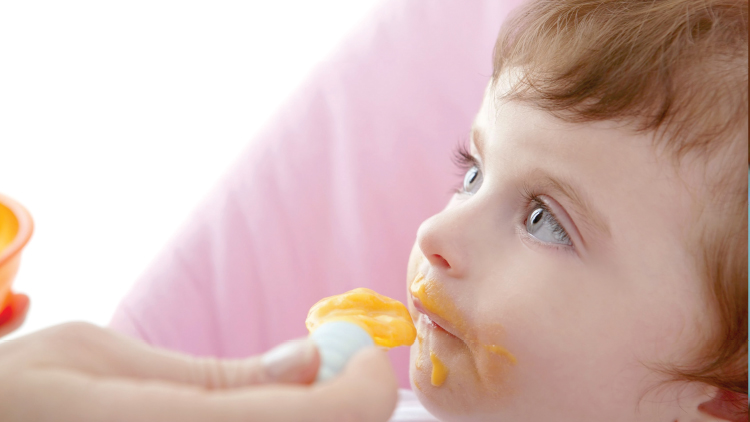Digest This – Spit-Ups
A spit-up happens when food is brought up from the stomach out of the mouth. Many babies spit up, especially in the first few months of life. When the stomach is full or your baby changes position, stomach contents can force the sphincter, the valve between the stomach and food pipe, the esophagus, to open and back up the esophagus. Spit-ups rarely cause problems and usually resolve once the digestive tract matures and a baby’s muscles become stronger. Spitting up is different from vomiting. Vomiting is a more forceful throwing up of stomach contents out of the mouth. Spitting up does not involve muscle contractions, and contents flow easily through the mouth.
Spitting up is also not the same as gastroesophageal reflux disease (GERD). If your baby is only spitting up but growing well and happy, this is not GERD. When your baby is fussy, spitting up excessively to the point of affecting weight gain, feeding poorly or vomiting, these may be symptoms of GERD. Speak to your doctor if you observe signs of GERD.
Reduce spits up by not overfeeding. Feed smaller amounts more frequently. Burp your baby often, during and after meals, to minimize gas in the stomach. Keep your baby upright after meals. Postpone laying on tummy after feeds to decrease the chance of spit-ups. For some babies, the type of formula could be contributing to the spit-ups. These babies may not tolerate the milk protein in a cow’s milk formula, a condition called cow’s milk protein intolerance (CMPI). This is not the same as lactose intolerance. For babies with CMPI, hypoallergenic formula for one to two weeks can help. If you think your baby may have CMPI, talk to your doctor for suggestions on formula change. Anti-acid medications have not been proven to reduce spit-ups. Spit-ups get better as your baby grows, usually by six to 12 months of age.
If spit-ups contain blood, this could be an irritated or inflamed esophagus. Vomiting forcefully after every feed is also not normal. Get your baby checked by their doctor right away.














